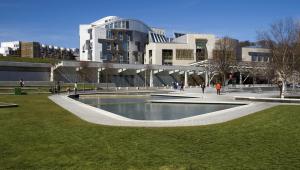MSPs voted by 67 to 59 to approve the general principles of the Budget Bill, the first stage of its path through the Holyrood. The substance of the deal between the Greens and the minority Scottish National Party government will be incorporated by amendments at later stages.
The government had already decided to use its devolved tax powers withhold next year’s increase in the 40p upper tax rate threshold from £43,000 to £45,000, which had been announced in the then chancellor George Osborne’s 2016 Budget, instead proposing to increase it in line with inflation to £43,450. However, under the deal with the Greens, there will be no increase in the threshold.
Taken with funds found by Mackay “as a result of my latest assessment of the financial assumptions that underpin next year’s budget,” the changes release an extra £160m for local authorities. This met Green demands for more help in safeguarding local services, and they agreed to vote for the SNP spending plans and abstain on tax, giving the Budget a slender parliamentary majority.
Mackay also announced an extra £25m for Scotland’s embattled national police force, and a further £35m for the economic development agency Scottish Enterprise, which had been facing heavy cuts.
An exultant co-convener of the Scottish Greens, Patrick Harvie, declared: "Green MSPs have achieved more in a single Budget than the Labour Party has in a decade of opposition.
"This is the biggest Budget concession in Holyrood's history and shows it's possible for parties to stay true to their aims while finding common ground in the interests of the public. By contrast, other parties have effectively ruled themselves out of constructive dialogue, leaving it to the Greens to push ministers beyond their comfort zone.”
The deal follows weeks of intense negotiations with all the Holyrood opposition parties, though only the Liberal Democrats (who wanted an extra £400m of spending) and the pro-independence Greens were seen as offering serious prospects of a compromise. The Conservatives wanted Scottish taxes limited to UK levels, while Labour sought a 1p across-the-board rise in income tax and a new 50p top rate.
Councils claimed they were facing a £350m cut, though Mackay has argued that it is offset by extra money for schools and health/social care partnerships not channelled through local authorities. In the event, a Labour amendment effecting its tax rise proposals mustered just 23 votes.
Opening an exceptionally bitter Holyrood debate on the first stage of the Budget Bill, Mackay welcomed the “constructive approach” of the Greens. “Once again this government has listened and acted,” he said. “By any measure, this Budget delivers for Scotland.”
Labour’s Scottish leader, Kezia Dugdale, accused the Greens of acting as “the fig leaf the nationalists so desperately want and so desperately need" and called Mackay’s approach to the negotiations “duplicitous.” The Lib Dems’ Willie Rennie called the deal “grey and timorous.”
The Scottish Tories’ Murdo Fraser said that local services would still be cut in spite of Scotland being the highest-taxed part of the UK: “The nationalists have shown contempt for the views of Scottish business, and have demonstrated they have zero interest in trying to help grow our under-performing economy,” he said. “This is a weak, hesitant and dismal set of measures.”
Don Peebles, the head of CIPFA Scotland, highlighted that the revised budget was a direct consequence of minority government, something that Scotland’s public services have not experienced for 10 years.
“The recent political volatility at parliamentary and government level threatens the longer term fiscal stability that our public services rely on. Therefore it is welcome news that the finance committee’s direction is now to budget over a longer time frame,” he added.




















